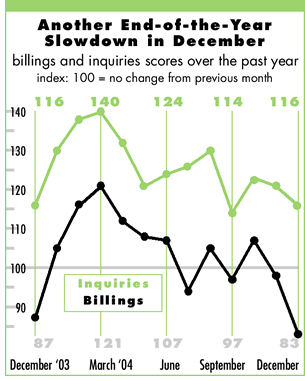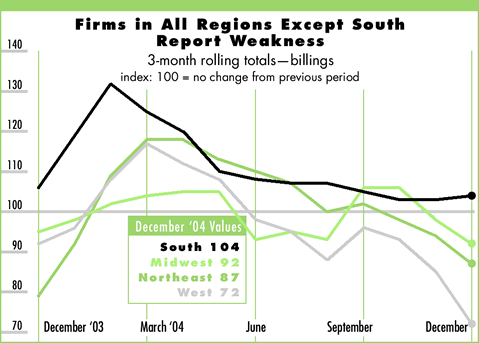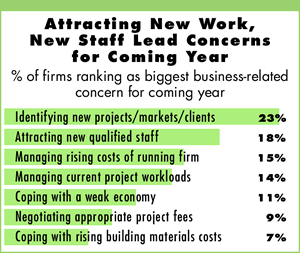

Business Conditions
at Architecture Firms Show Their Normal December Swoon
Identifying new projects and attracting new staff rank as top business
concerns for 2005

by Kermit Baker,
PhD, Hon. AIA
Chief Economist
 Billings at U.S. architecture firms were very soft
in December, reflecting their typical year-end slowdown due to staff
time off, poor weather, and difficulty in getting client approvals during
the holiday season to move ahead on projects. Over twice as many firms
reported a decrease in billings (31 percent) as reported an increase
(14 percent), percentages generally comparable with those reported by
firms in previous Decembers. Even with this normal downturn, commercial/industrial
firms reported unusually weak billings in December.
Billings at U.S. architecture firms were very soft
in December, reflecting their typical year-end slowdown due to staff
time off, poor weather, and difficulty in getting client approvals during
the holiday season to move ahead on projects. Over twice as many firms
reported a decrease in billings (31 percent) as reported an increase
(14 percent), percentages generally comparable with those reported by
firms in previous Decembers. Even with this normal downturn, commercial/industrial
firms reported unusually weak billings in December.
Firms continue to report rising levels of inquiries for new projects. Twice as many firms reported an increase in inquiries in December as reported declines (32 percent vs. 16 percent). Commercial/industrial firms reported very strong gains in inquiries, even as their billings fell. Institutional firms, however, reported flat levels of inquiries.
Billings declined at firms in all regions except the South. Firms in the West reported a particularly sharp drop in billings. The level of inquiries for new work improved for firms in all regions, but the upturn was particularly strong for firms in the Midwest.

Economy
moving the right way
The economy finished the year moving in a generally positive direction.
Business payrolls increased by 157,000 in December, the sixteenth straight
month of gains, thereby generating 2.2 million net jobs for our economy
in 2004. The construction sector contributed more than 250,000 of these
jobs last year. The Economic Cycle Research Institute’s index
of leading economic indicators has increased three of the past four
months, indicating that the economy is poised to see more growth in
the months ahead.
Consumer sentiment has moved up sharply over the past two months according to the University of Michigan survey, but the Conference Board reports that business confidence has declined each of the past three quarters. Inflation remains a concern: Despite the decline in wholesale prices in December, they climbed more than 4 percent in 2004 overall, and more than 2 percent when food and fuel components are netted out. The construction industry has felt this rising inflation with the rising costs of construction commodities.
 Firms’ concerns
vary widely
Firms’ concerns
vary widely
Firms are generally expecting improving business conditions this coming
year. However, when asked to name their biggest business-related concern
for 2005, firms were split between concerns generally associated with
a strong economy and those generally associated with a weak economy.
Concerns generally associated with a strengthening economy: attracting new qualified staff (18 percent listed this as their biggest concern); managing rising costs of running the firm, such as employee benefits and liability insurance (15 percent); managing current project workloads (14 percent); and coping with rising building materials costs (7 percent) all ranked high on the list of concerns.
However, also ranking high were concerns that generally are associated with weaker business conditions: identifying new projects/new markets/new clients surpassed all other concerns, with 23 percent of firms putting it at the top of their list. Coping with a weak economy was listed by 11 percent of firms as their chief concern for the coming year.
Negotiating appropriate project fees—a concern often mentioned independent of business conditions—was named by 9 percent of firms as their chief worry. Retaining current staff was listed by only 1 percent of firms. Other major concerns listed were: slow collections, coping with changes in technology, regulatory issues, ownership succession planning, and unfair competitive practices.
Copyright 2005 The American Institute of Architects.
All rights reserved. Home Page ![]()
![]()
 |
||
| This month, Work-on-the-Boards survey participants are saying: • Our state has a shrinking economy and tax base. Very
little private investment. • Still strong residential market. Seeing increased strength
in retail. • We are fairly confident that this year will be much better
than the past four.
|
||